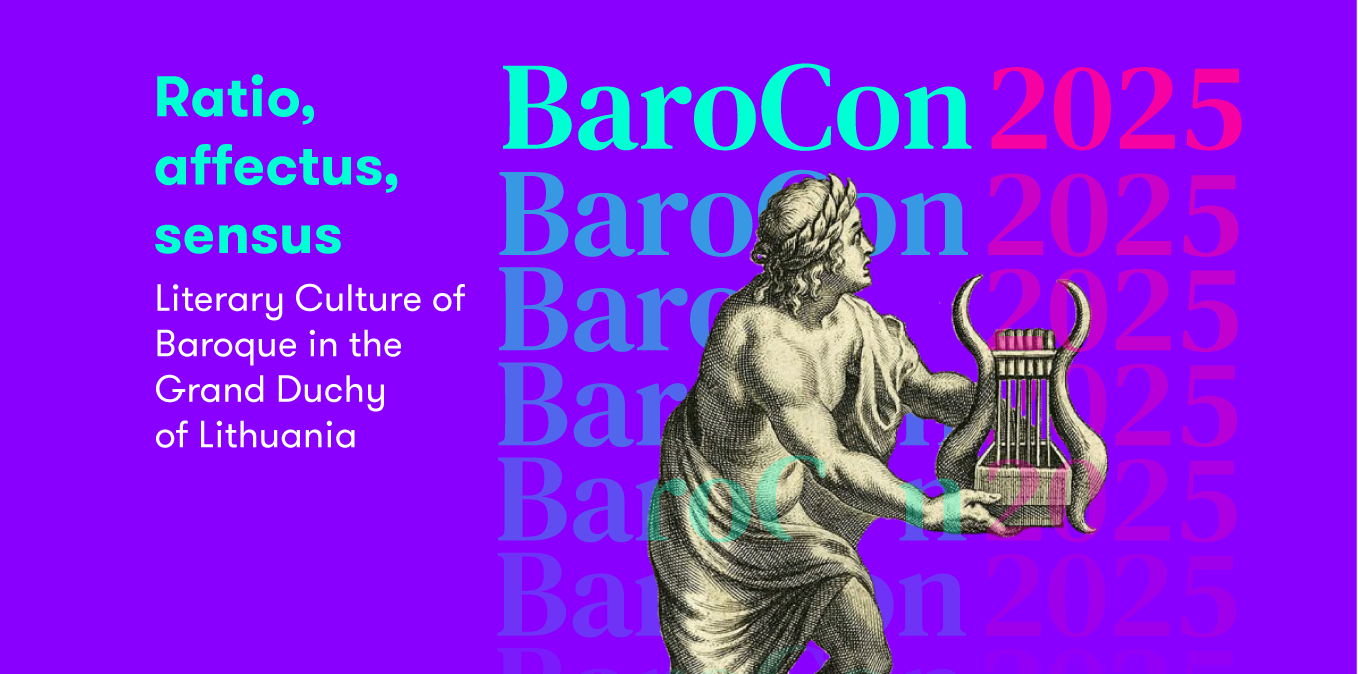Ratio, affectus, sensus: Literary Culture of the Baroque in the Grand Duchy of Lithuania
In 2025, we will commemorate the 400th anniversary of the first publication of Matheus Casimirus Sarbievius' most famous Latin poetry collection 'Lyricorum libri tres' (1625). This has led to 2025 being declared the Year of Baroque Literature in Lithuania. The eminent Jesuit neo-Latin poet of the Polish-Lithuanian Commonwealth, Sarbievius, has been hailed as the Christian Horace and the Sarmatian Horace. His theoretical thoughts on poetry and rhetoric are still highly regarded and have inspired new research on other concurrent themes and authors. This anniversary provides an opportunity to explore the extent and diversity of Baroque literary culture, which has seen a surge of interest in recent decades, both in the academic world and in popular culture. Therefore, the Institute of Lithuanian Literature and Folklore, together with the Faculty of Philology of Vilnius University, is organising an international academic conference "Ratio, affectus, sensus: Literary Culture of the Baroque in the Grand Duchy of Lithuania" on 25-27 September 2025 in the baroque city of Vilnius.
The aim of the multidisciplinary conference is to stimulate discussion on the literary culture of the "long seventeenth century" (from the end of the 16th century to the middle of the 18th century) in the Grand Duchy of Lithuania. This historical period, associated with dramatic changes and a general cultural crisis, is often described in contradictory terms and in constant tension between reason and senses, rigid structure and passions, classifications and impressions, etc. By embracing this contradiction, we invite an exploration of the theme in question through the lens of this dynamic interplay between reason (ratio), emotion (affectus) and the senses (sensus), which can be perceived in various genres of the period, such as poetry, biography, hagiography, rhetoric, private and public correspondence, and so on. The importance of the modern approach lies not only in what it can reveal about the Baroque in the Grand Duchy of Lithuania, but also about subsequent and contemporary literary culture, as scholars have demonstrated the continuing influence of a 'Baroque spirit'.
Event location
25–26 September the conference will take place at V. Krėvė (118) auditorium, Faculty of Philology
27 September the conference will take place at the Church Heritage Museum, Šv. Mykolo g. 9 (entrance from Maironio g. "Arkangelo konferencijų centras")
Keynote speakers

Ona Dilytė-Čiurinskienė
Senior Researcher, The Institute of Lithuanian Literature and Folklore
Prof Stephen Harrison
Professor of Latin literature, University of Oxford
Dovilė Čitavičiūtė
Marriage as Politics: Aristotelian Views on Women and Family in Baroque Lithuania women of the GDL
Dovilė Čitavičiūtė
The Institute of Lithuanian Literature and Folklore
Marriage as Politics: Aristotelian Views on Women and Family in Baroque Lithuania women of the GDL
Keywords: Aristotelian philosophy, family politics, Aaron Alexander Olizarovius
Aristotle’s works, including the pseudo-Aristotelian Economics, played a pivotal role in shaping Early Modern gender and social theory, particularly through their widespread dissemination in Latin translations and commentaries. While the European Renaissance witnessed extensive debates on the "woman question", these discussions emerged in the Grand Duchy of Lithuania several centuries later, coinciding with the flourishing of Baroque intellectual culture in Vilnius. Scholars at Vilnius University, including the philosopher Aaron Alexander Olizarovius (1610–1659) and students such as Michał Mniszek and Michael Moygis, engaged with Aristotelian thought to examine women's roles within the family and society, particularly in relation to authority and virtue. This paper argues that Aristotelian philosophers in the Grand Duchy of Lithuania, like their European counterparts, conceptualized the domus—the household—not as a private sphere but as a fundamentally political space, where civil happiness and the stability of the state were negotiated. Central to these debates was the marital relationship within noble families which was framed not as a purely personal bond but as a civic and political institution governed by established duties and expectations. Two dominant intellectual currents emerged: one advocating the patriarchal authority of husbands, often justified through biblical interpretation, and another proposing a more reciprocal, legally structured model of marriage. This paper highlights how Aristotelian notions of rationality, virtue, and gender differences shaped Baroque Lithuanian perspectives on women—not as inherently subordinate, but as autonomous agents integral to the state. Unlike many of his contemporaries who viewed women through the lens of natural inferiority, Olizarovius offers a more nuanced and progressive vision of women’s roles within marriage, positioning them as active participants in the moral and civic order.


